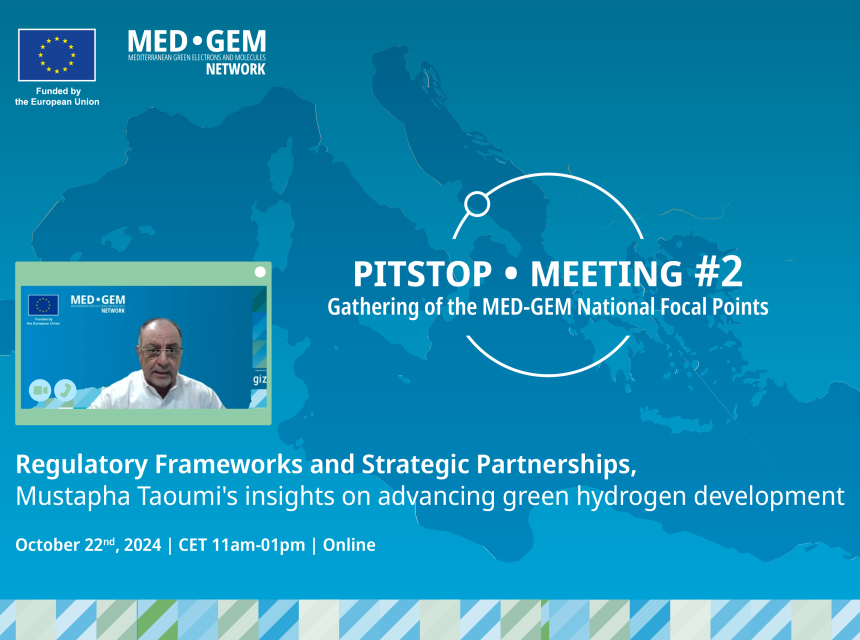Regulatory Frameworks and Strategic Partnerships: Mustapha Taoumi's insights on advancing green hydrogen development
On October 22, 2024, Dr Mustapha Taoumi, key expert in green energy and renewables and representative of the MED-GEM Network, presented a comprehensive overview of the regulatory framework for green hydrogen development at the mid-term Steering Committee "Pitstop Meeting." This exclusive session, aimed at National Focal Points and key country representatives of the MED-GEM project, focused on assessing progress and addressing regulatory challenges critical to advancing green hydrogen across Europe and beyond. The presentation covered topics such as current hydrogen legislation, responsible authorities, safety regulations, permitting procedures, and a case study on Germany's legislative approach.
The importance of infrastructure and regulation
Dr Mustapha Taoumi's presentation began with an overview of European Union initiatives, particularly the recently established regulatory framework to support green hydrogen development. Central to this strategy is the European Hydrogen Infrastructure Operators Network, created by the European Commission. This network is crucial for advancing hydrogen infrastructure, integrating it with existing gas and electricity grids, and ensuring the safety of these infrastructures.
He also highlighted Germany's example, where significant reforms have been implemented through the Energy Act. This legislation, backed by extensive public consultation, supports the creation of core hydrogen networks that connect key regions of the country, while incorporating safety standards and certification requirements.
The role of public-private partnerships and international cooperation
Dr Mustapha Taoumi emphasized the importance of public-private partnerships to drive green hydrogen development. These collaborations unite public and private actors, research institutions, NGOs, and policymakers to build a reliable and sustainable hydrogen market. He reaffirmed the MED-GEM Network’s mission to facilitate these synergies and foster transregional cooperation by advocating for inclusive dialogue platforms.
International cooperation was another key theme. Aligning European strategies with global initiatives, especially in the Mediterranean and Africa, is critical to ensuring the harmonious development of the hydrogen market. Dr Mustapha Taoumi underscored the strategic role of the Mediterranean region, which, with its abundant renewable energy resources, could become a major hub for exporting green hydrogen to Europe.
Challenges and opportunities: Research & Development (R&D)
R&D was identified as a crucial lever to ensure the efficiency of green hydrogen production technologies. Europe and its member states, through the Clean Hydrogen Partnership, are actively funding innovative projects aimed at improving electrolysis technologies and reducing production costs. However, global competition remains fierce, and maintaining high R&D investment levels is essential to keep Europe at the forefront of the sector.
Dr Mustapha Taoumi also stressed the need for targeted investments in storage, transportation, and distribution infrastructures to ensure an efficient supply chain. These infrastructures, particularly in hard-to-decarbonize sectors such as heavy industry and mobility, present a key opportunity for green hydrogen.
Recommendations for a successful transition
In conclusion, Dr Mustapha Taoumi put forward several recommendations to accelerate green hydrogen development:
Strengthen regulatory frameworks and public policies
Regulations need to be harmonized across countries to provide a stable legal environment. This will boost investor confidence and facilitate cross-border cooperation.
Adopt a phased approach
Deploy hydrogen infrastructures in stages, learning from past mistakes to ensure effective implementation. This strategy also helps secure testing and validation phases for new technologies.
Support incentive mechanisms
Green hydrogen development requires support mechanisms such as subsidies, tax credits, and other financial incentives to accelerate the transition to decarbonized energy systems.
Encourage inclusive partnerships
It is essential to include all stakeholders—governments, private companies, researchers, and civil society—in developing a shared vision for green hydrogen.
Accelerate international cooperation
The development of the hydrogen market depends on strengthened cooperation between producing and consuming countries, particularly between Europe and Mediterranean and African nations.
Q&A Session on regulatory frameworks for green hydrogen development
During the subsequent Q&A session, various technical and strategic issues were raised.
Hydrogen sources
Mr Ali Kanzari inquired about the potential of producing green hydrogen from non-renewable sources such as nuclear and biomass. In response, Mustapha M. Mustapha Taoumi clarified that current strategies do not include nuclear as a source of green hydrogen, which is primarily associated with renewable energies. He also mentioned advancements in using seawater for electrolysis, though details are still under development. Frank Wouters added that direct seawater electrolysis remains in the research phase, particularly in China, but highlighted that desalinating seawater via reverse osmosis only adds 1-2% to the total cost of hydrogen production. He also pointed out that this method could provide potable water for local communities in arid regions.
Nuclear hydrogen production
Mr Ali Habib noted the use of nuclear energy for hydrogen production in Ukraine, which, though not recognized as green in the EU, could be accepted in other countries. He also questioned the minimum efficiency required for electrolyzers under regulations. M. Mustapha Taoumi explained that these regulations aim to promote more efficient technologies to minimize losses in hydrogen production and subsequent processes like ammonia conversion.
Market readiness
Engineer Yacoub Marrar expressed concerns about the commercial demand for green hydrogen, suggesting that the market is still in its preparatory phase despite pilot projects. M. Mustapha Taoumi acknowledged the slower-than-expected market development, particularly in the Mediterranean region, but stressed the importance of initiating export projects, which could eventually stimulate local market creation.
Permitting processes
Finally, Mr Bandaly El Issa raised a question about the permitting processes for hydrogen projects. Dr Mustapha Taoumi responded that each country should designate a dedicated agency or assign this role to an existing institution, as Germany has done by involving multiple actors in managing permits.

